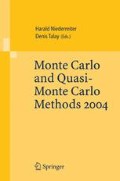Summary
This paper proposes a new adaptive importance sampling (AIS) technique for approximate evaluation of multidimensional integrals. Whereas known AIS algorithms try to find a sampling density that is approximately proportional to the integrand, our algorithm aims directly at the minimization of the variance of the sample average estimate. Our algorithm uses piecewise constant sampling densities, which makes it also reminiscent of stratified sampling. The algorithm was implemented in C-programming language and compared with VEGAS and MISER.
The work of this author was supported by Finnish Academy under contract no. 3385
Access this chapter
Tax calculation will be finalised at checkout
Purchases are for personal use only
Preview
Unable to display preview. Download preview PDF.
References
I. Babuška and W. C. Rheinboldt. Error estimates for adaptive finite element computations. SIAM J. Numer. Anal., 15(4):736–754, 1978.
Lars O. Dahl. An adaptive method for evaluating multidimensional contingent claims: Part I. International Journal of Theoretical and Applied Finance, 6:301–316, 2003.
Daniel Fink. Automatic importance sampling for low dimensional integration. Working paper, Cornell University, 2001.
A. C. Genz. Testing multidimensional integration routines. Tools, Methods and Languages for Scientific and Engineering Computation, pp. 81–94, 1984.
Tim C. Hesterberg. Weighted average importance sampling and defensive mixture distributions. Technometrics, 37(2):185–194, 1995.
E. Hlawka and R. Mück. Über eine Transformation von gleichverteilten Folgen. II. Computing (Arch. Elektron. Rechnen), 9:127–138, 1972.
G. P. Lepage. A new algorithm for adaptive multidimensional integration. Journal of Computational Physics, 27:192–203, 1978.
A. B. Owen and Y. Zhou. Adaptive importance sampling by mixtures of products of beta distributions, 1999. URL http://wwwstat.stanford.edu/~owen/reports/.
W. H. Press, S. A. Teukolsky, W. T. Vetterling, and B. P. Flannery. Numerical recipes in C, The art of scientific computing. Cambridge University Press, Cambridge, 2nd edition, 1992.
W. H. Press and G. R. Farrar. Recursive stratifield sampling for multidimensional monte carlo integration. Computers in Physics, 27:190–195, 1990.
R. T. Rockafellar. Convex analysis. Princeton Mathematical Series, No. 28. Princeton University Press, Princeton, N.J., 1970.
Ping Zhang. Nonparametric importance sampling. J. Amer. Statist. Assoc., 91(435):1245–1253, 1996.
Author information
Authors and Affiliations
Editor information
Editors and Affiliations
Rights and permissions
Copyright information
© 2006 Springer-Verlag Berlin Heidelberg
About this paper
Cite this paper
Pennanen, T., Koivu, M. (2006). An Adaptive Importance Sampling Technique. In: Niederreiter, H., Talay, D. (eds) Monte Carlo and Quasi-Monte Carlo Methods 2004. Springer, Berlin, Heidelberg. https://doi.org/10.1007/3-540-31186-6_27
Download citation
DOI: https://doi.org/10.1007/3-540-31186-6_27
Publisher Name: Springer, Berlin, Heidelberg
Print ISBN: 978-3-540-25541-3
Online ISBN: 978-3-540-31186-7
eBook Packages: Mathematics and StatisticsMathematics and Statistics (R0)

